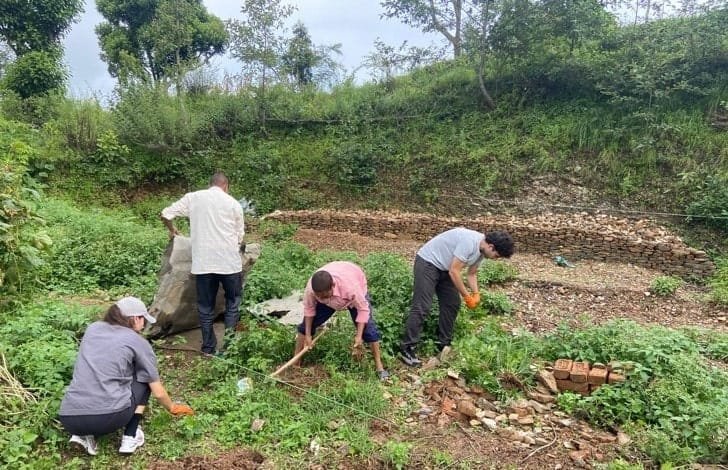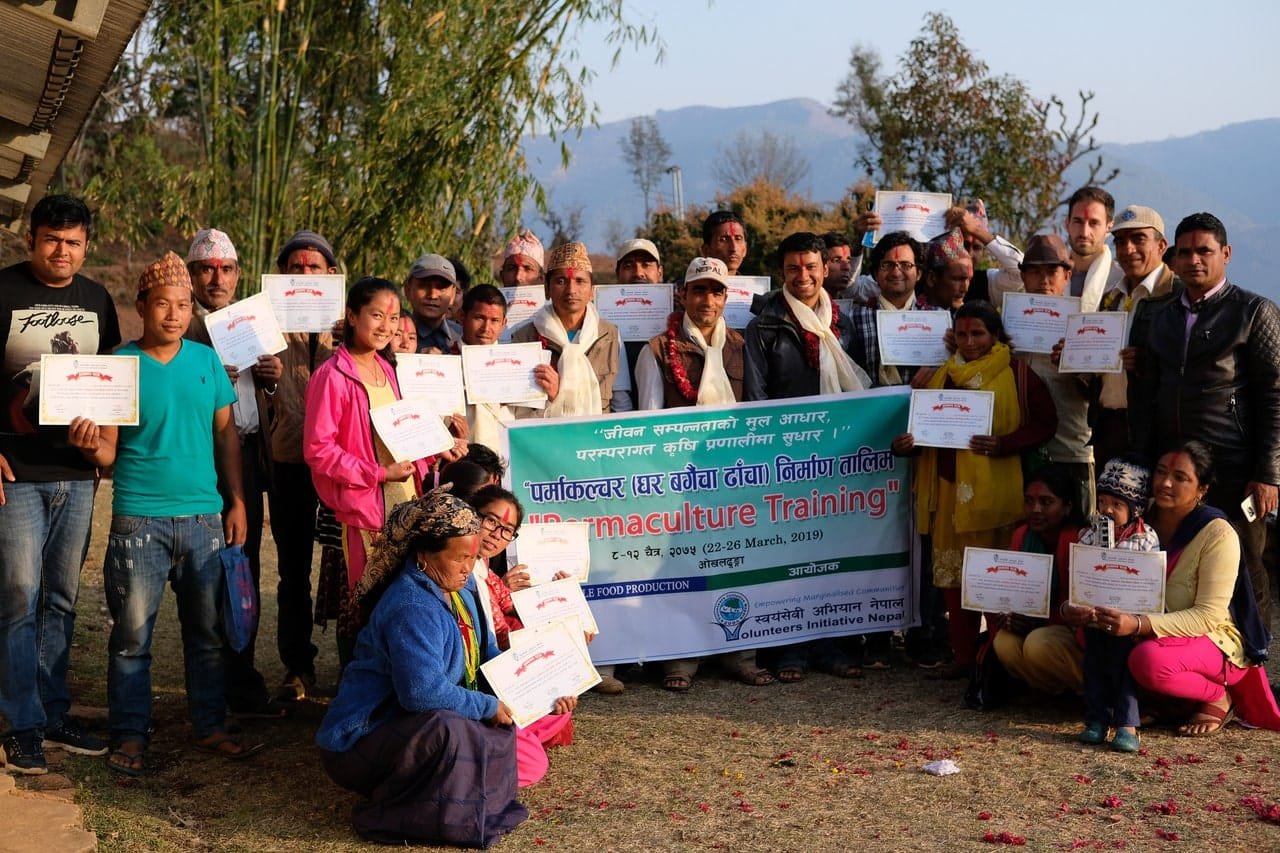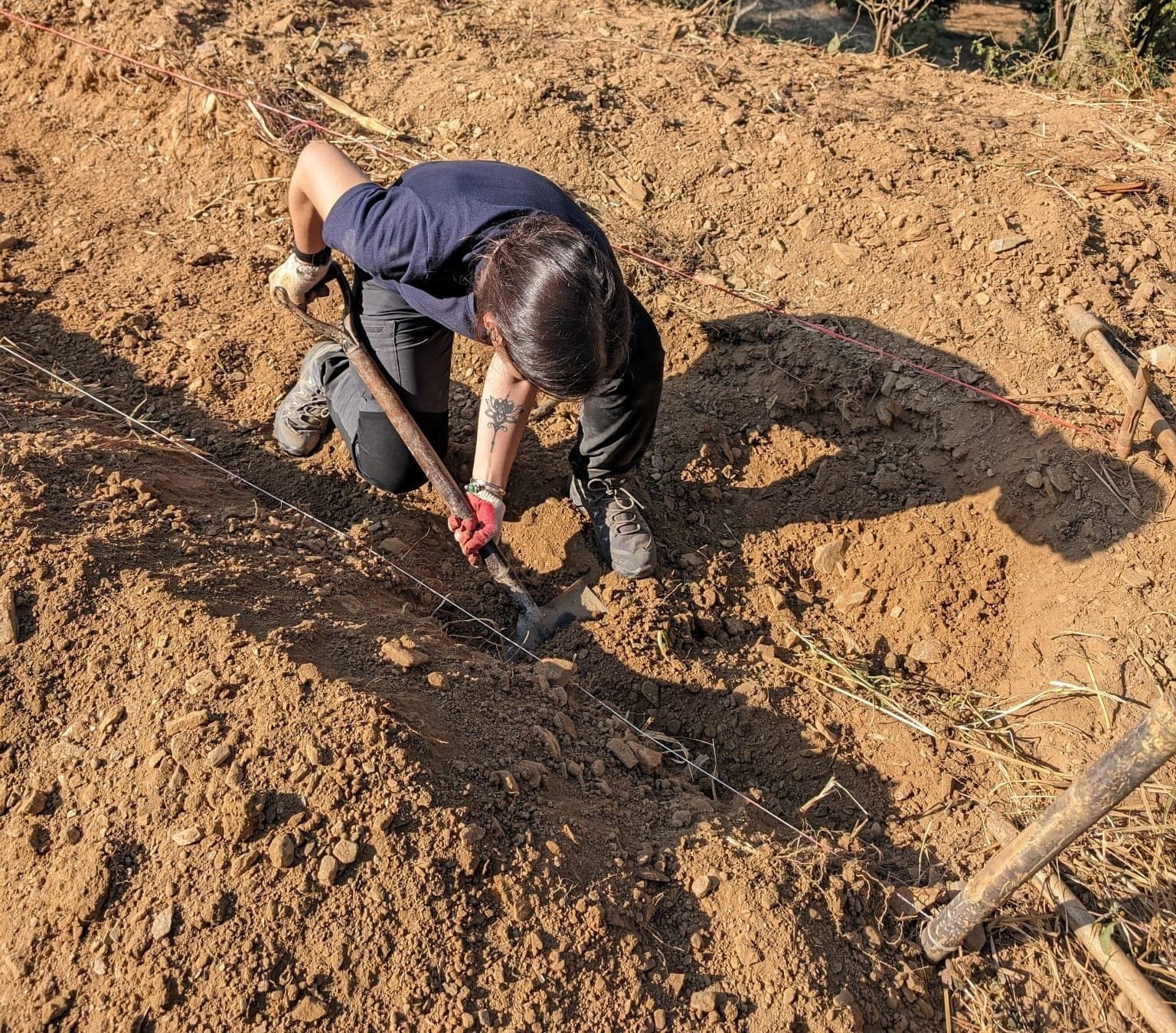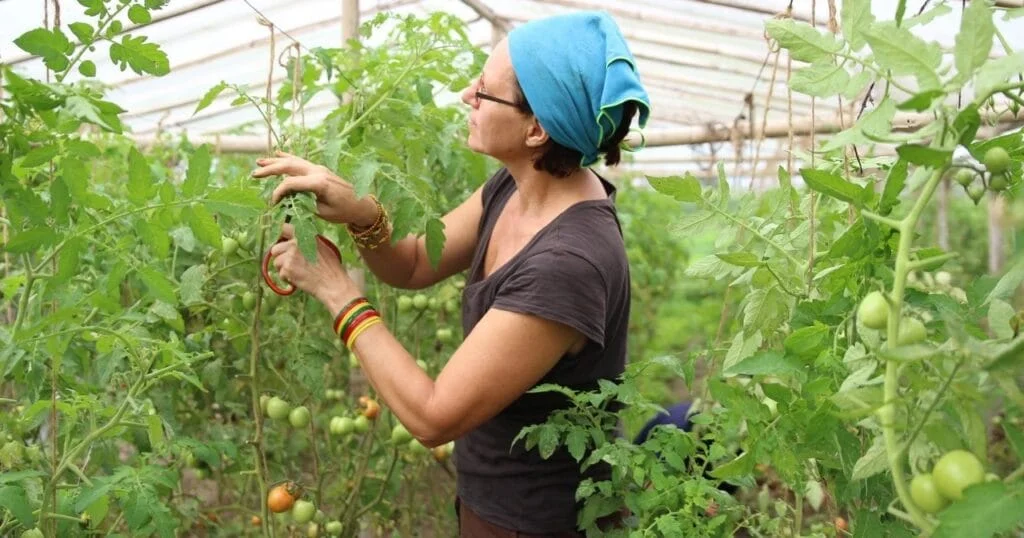Permaculture Volunteering – Embrace Sustainable Agriculture and Regenerative Practices in Nepal
Are you eager to explore permaculture volunteering in a culturally rich destination while supporting local communities? Volunteers Initiative Nepal (ViN) invites you to join our permaculture volunteer programs, collaborating with farmers and eco-advocates committed to creating a greener, more resilient future. This project combines ecological design, sustainable land use, and communal well-being, showcasing how small-scale, intentional interventions can yield significant food security and environmental protection results.
You will discover practical applications of permaculture through volunteer opportunities in Nepal’s terraces, villages, and valleys. These include composting, crop rotation, water conservation, and renewable energy practices. By aligning your passion for nature with the needs of local communities, you will gain hands-on experience in agroecology while forming unforgettable connections. This comprehensive guide outlines how you can contribute to eco-friendly farming, cultural preservation, and community self-sufficiency, grounded in permaculture principles.
1. Project Snapshot / Overview
- Project Name: Permaculture & Sustainable Farming Volunteer Program in Nepal
- Tagline: “Grow Solutions, Cultivate Community”
This permaculture volunteering project collaborates with local farmers, educational centers, and NGOs to foster sustainable farming volunteer solutions. Participants learn and practice eco-friendly methods, from soil improvement to water-saving irrigation. Volunteers ensure balanced yields, minimize chemical inputs, and nurture local biodiversity by bridging modern permaculture insights with time-honored Nepali traditions.
2. Project Description
Introduction
“Nepal’s majestic landscape yields immense natural wealth and diversity, yet environmental degradation, monocropping, and climate stress threaten rural food systems. Our permaculture volunteering initiative aims to restore land health, strengthen local economies, and empower communities to become stewards of their environments.”
Volunteers help host communities adopt circular resource management, integrate livestock ethically, and diversify crops to stabilize harvests year-round. Beyond crop fields, you’ll explore farm-to-table processes, from compost prep to marketing produce. This synergy fosters ecological restoration volunteer efforts and farmers’ economic resilience.
Background
Nepal’s agricultural fabric spans high-altitude apple orchards, hillside rice paddies, and lowland vegetable farms. Recent decades brought chemical reliance and deforestation, undermining soil fertility. Meanwhile, climate variability triggers unpredictable rainfall, leading to erosion and water scarcity. About 70% of Nepal’s population depends on agriculture, highlighting the urgent need for organic farming volunteer approaches that reduce chemical inputs while enhancing yields.
Local farmers can gradually transition away from harmful practices by adopting sustainable agriculture volunteer strategies like permaculture, rotational grazing, and integrated pest management. This Permaculture Volunteering method focuses on synergy—aligning every aspect of the farm’s ecosystem for minimal waste and maximum biodiversity.
Key Objectives
- Promote Ecological Farming Systems
- Implement polyculture patterns, composting, and integrated livestock-crop cycles.
- Safeguard Soil and Water Quality
- Erode less, minimize chemical leaching, and preserve precious water resources.
- Foster Community Self-Sufficiency
- Encourage local seed saving, direct marketing, and collaborative eco-based initiatives for sustained social development.
3. Why Internship for Permaculture Volunteering Project?
The Need
Rural Nepali farmers often lack training in regenerative or agroecology volunteer frameworks, leading to land depletion, excessive pesticide usage, or yield instability. Statistics show more than 30% of arable land has lost substantial fertility. In an economy reliant on smallholder farms, such outcomes hurt food security, incomes, and natural habitats. Permaculture volunteering merges external expertise with homegrown wisdom, bridging knowledge gaps and catalyzing solutions that preserve farmland for future generations.
Global Relevance
The push toward climate resilience and carbon sequestration resonates worldwide. UN Sustainable Development Goals highlight zero hunger (SDG 2) and climate action (SDG 13) as top priorities. By pursuing Permaculture Volunteering programs in Nepal, you actively contribute to the global movement of regenerative agriculture volunteer efforts—reinforcing sustainable living volunteer actions that fortify communities against climate threats.
Local Voices
“We used chemicals for quick yields, but soils became weak. Now, with mulching, diverse crops, and organic compost, the land is fertile again—and we see the difference in taste and income.”
— Farmer in Dhading
“Volunteers introduced drip irrigation and pond-water storage. Even in drier months, we kept vegetables alive. This approach is sustainable and less reliant on unpredictable rainfall.”
— Community Leader in Nuwakot
4. Interns Roles and Responsibilities
As a Permaculture Volunteering volunteer under the “Permaculture & Sustainable Farming Project,” you can anticipate a broad spectrum of roles:
10 Core Tasks
- Soil Restoration & Composting
- Collect organic waste, manage compost piles, and educate locals on vermicomposting.
- Organic Seed Saving & Nursery
- Assist farmers in storing heirloom seeds, maintaining small nurseries, and ensuring robust seedlings for local distribution.
- Designing Crop Patterns
- Work with local landowners to plan intercropping systems or create swales/contours for water retention.
- Livestock Integration
- Learn about rotating goats, chickens, or cows between plots for natural fertilization, fewer pests, and diverse yields.
- Community Gardening Volunteer
- Support communal kitchen gardens near schools or clinics, promoting easily accessible fresh produce.
- Regenerative Agriculture Volunteer Workshops
- Co-host training on climate-smart farming—like no-till methods, beneficial insects, or companion planting.
- Eco Infrastructure
- If skilled, build or refine small-scale irrigation, biogas units, or simple solar-based solutions.
- Water Conservation
- Oversee techniques like mulching, drip lines, or rainwater capture, teaching families to reduce irrigation demands.
- Crop Harvest & Market Linkage
- Harvest seasonal produce and help local farmers brand or sell via cooperatives or farmer markets.
- Environmental Awareness
- Advocate for zero-waste, minimal plastic usage, and eco-lifestyle transitions in the broader community.
Daily Activities
A typical day for an Permaculture Volunteering volunteer might look like:
- 8:30 – 9:15 AM: Breakfast at your homestay or volunteer dorm
- 9:15 – 10:00 AM: Walk or bus to the farmland site
- 10:00 – 1:00 PM: Tending compost, weeding, or assisting with orchard tasks
- 1:00 – 2:00 PM: Lunch break (enjoy local organic meals)
- 2:00 – 4:00 PM: Leading an educational workshop for farmers or building a small greenhouse bed
- 4:00 – 5:00 PM: Debrief with local staff, plan the next day
- 5:00 – Evening: Cultural immersion, free time, or reflection
Special Projects
- Forest Garden: Some volunteers pioneer an edible forest approach, planting fruit trees beneath layered canopies to mimic natural ecosystems.
- Farm-to-School Program: Others guide local youth to cultivate small organic plots, bridging classroom learning and real agriculture.
5. Skills and Requirements
Required Skills
- Passion for Nature & Agriculture: Keen interest in sustainable land use and willingness to adapt.
- Teamwork: Ability to collaborate with local farmers, staff, or other volunteers on group tasks.
- Physical Fitness: Farm chores can be strenuous—lifting, digging, or bending frequently.
Eligibility
- Age: Usually 18+ (exceptions can be made if minors are accompanied or have guardians’ permission).
- Commitment: At least two weeks is recommended, but the best outcomes often come from a 4–12-week involvement.
- Open Attitude: Embrace local methods and remain receptive to new perspectives or rural conditions.
Preferred Skills
- Agricultural/Horticultural Experience: Knowledge of sowing, greenhouse management, and orchard care is beneficial but not mandatory.
- Biology or Environmental Studies: A formal background is a bonus for advanced tasks.
- Teaching/Workshop Hosting: Skills for short courses for children or adult farmers.
6. Cultural Experience
Cultural Immersion
Volunteering in rural Nepal provides immersion into festivals like Tihar or Dashain, plus daily interactions over dal bhat (rice and lentils). This direct contact fosters mutual respect and an appreciation of how cultural values shape land stewardship.
Language Learning
You’re not required to speak fluent Nepali. But picking up basic phrases—like “Namaste” (greeting) or “Dhanyabad” (thank you)—builds rapport. Some volunteers also choose to attend short language lessons for deeper connections.
7. Logistics and Support
Accommodation
- Shared Volunteer Houses: Typically near farmland or project HQ.
- Homestays: Perfect for more profound cultural exchange—live with a family and share daily routines.
- Rural Lodgings: In some mountainous locations, expect more spartan living conditions.
Meals
- Nepali Meals: Generally, rice, lentils, and seasonal veggies are served thrice daily.
- Diet Preferences: Many families are used to vegetarian requests. If you have dietary restrictions, let staff know early.
Transportation
- Airport Pickup: Coordinators greet you at Tribhuvan International Airport in Kathmandu.
- Commutes: Usually local buses or short walks. Some remote postings require jeep rides or mild hiking.
On-Site Support
- Staff Coordinators: Provide orientation, handle cultural bridging, and manage daily tasks.
- Farmers and Local NGOs: Offer practical insights, ensuring collaborative synergy.
- Health & Safety: Guidance on recommended vaccines, travel insurance, plus emergency contacts is standard.
8. Program Fees and Inclusions
For detailed cost breakdowns, visit Program Fees. Generally, fees cover:
- Accommodation & Meals: Basic lodging and local cuisine.
- Staff Coordination: Round-the-clock assistance, project matching.
- Training Materials: Intro to permaculture principles, farm equipment usage, and local language basics.
Flights, personal insurance, and side trips are not included. Some specialized tasks (e.g., orchard expansions) might demand extra resources or tools.
9. Impact and Outcomes
Volunteer Impact
Volunteers gain:
- Technical Knowledge: Hands-on experience in composting, pest control, orchard maintenance.
- Personal Growth: Enhanced leadership, cross-cultural teamwork, and problem-solving.
- Professional Advantage: A standout resume entry illustrating commitment to sustainability and climate solutions.
Community Impact
- Reduced Chemical Usage: Encouraging compost or organic pest strategies shrinks reliance on synthetic fertilizers, safeguarding local ecosystems.
- Sustainable Agriculture Volunteer Gains: Farmers preserve biodiversity, produce chemical-free crops, and expand marketing options.
- Social Empowerment: By seeing successful results from permaculture volunteer opportunities, entire communities realize they can drive positive change without draining natural resources.
“After introducing cover cropping and mulch with volunteer help, our yields rose, and our farmland looks greener than ever.”
— Village Elder in Okhaldhunga
10. Success Stories and Testimonials
Volunteer Experiences
Sofia from Italy
“I had zero farm knowledge, but the permaculture volunteer programs taught me about layering soil and water conservation. The locals embraced me warmly—I left with new friendships and a deeper love for nature.”
Jonathan from the USA
“Working as an eco-farming volunteer in a hillside orchard was eye-opening. The synergy between orchard trees, bees, and cover crops was mesmerizing. Best of all, I helped kids start a small garden behind their school, introducing them to compost techniques.”
Local Impact Stories
- Regenerative Agriculture Volunteer Efforts: Volunteers collaborated with local youth clubs to restore abandoned terraces in one region. They introduced micro-clover, fruit saplings, and water catchment, rejuvenating the land in less than six months.
- Community Workshops: Another group led free sessions on composting and worm farming. Over 40 families started homemade compost bins, witnessing improved soil structure and reduced trash disposal.
11. Application Process
Ready to immerse yourself in permaculture volunteering? Follow these steps:
- Complete the Online Application: Apply Now
- Submit Your Resume: Attach your CV plus two professional or academic references.
- Await Confirmation: Look out for an acceptance email containing further instructions.
- Pay the Booking Fee: Secure your slot with a €150 deposit.
- Receive the Pre-Departure Pack: Cultural guidelines, packing suggestions, and schedule details.
- Final Payment: Process the remaining fee upon arrival or via wire transfer.
12. FAQs
Below are the seven top questions about Permaculture Volunteering opportunities in Nepal:
- Do I need prior farming or permaculture experience?
Basic gardening or environmental knowledge helps, but many volunteers are newcomers: enthusiasm and a willingness to learn matter most. - How does permaculture volunteering differ from regular farming volunteers?
Permaculture emphasizes holistic, sustainable design—like soil-building, water conservation, and natural synergy—rather than just field labor. - Are these permaculture volunteer programs physically demanding?
Yes, often. Expect tasks like digging, weeding, or building terraces. We adapt roles to your fitness level and comfort. - Will I get a certificate or references after finishing my permaculture volunteer opportunities?
Yes. Upon successful completion, we issue a certificate detailing your tasks, achievements, and the skills you showcased. - Can I combine volunteer tasks with travel or trekking?
Absolutely. Many volunteers explore Nepal’s hiking trails or cultural spots on weekends or after the program. - What about language barriers?
Local staff often speak English, and volunteers pick up Nepali basics. Interpreters help in deeper field interactions. - How do we measure the program’s success in local communities?
We track data on orchard yields, soil health, water usage, and local acceptance of sustainable methods. Observed improvements reflect success.
13. Call to Action
Join Us Today to Make a Difference!
Ready to embrace nature and share eco-friendly knowledge with local Nepali communities? Our permaculture volunteering project awaits your energy and insight. Learn from these mountain farms, transform them into thriving ecological micro-systems, and discover the meaning of synergy between humans and the Earth.
- Apply Now
- Contact us: support@vin.org.np
Share this opportunity with family, classmates, or colleagues. Inspire them to explore Permaculture Volunteering programs in Nepal, forging a path toward sustainable living volunteer experiences. Let’s sow seeds of renewal—one orchard, one compost pile, one community at a time.
Gallery



